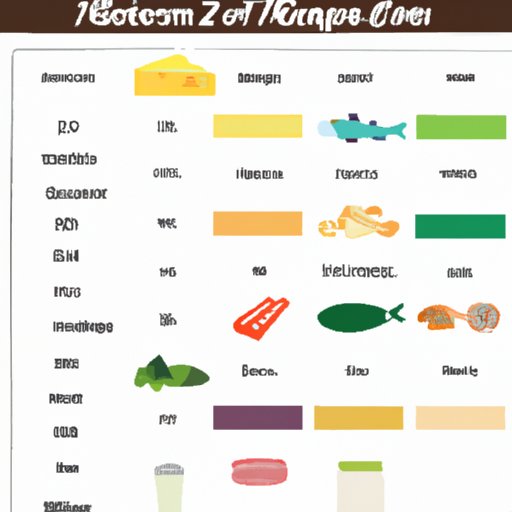Introduction
Macronutrients are the major components of food that provide energy and essential nutrients for our bodies. They include carbohydrates, proteins, and fats, and they play a crucial role in nutrition and health. Macronutrients are important for providing the body with energy, building and repairing tissue, and regulating hormones and other bodily processes. Understanding the role of macronutrients in nutrition is key to achieving optimal health and well-being.

Explaining Macros: A Comprehensive Guide to Macronutrients
In order to understand the importance of macronutrients in nutrition, it’s important to first define what they are. Macronutrients are the major components of food that provide energy and essential nutrients for our bodies. They include carbohydrates, proteins, and fats. These three macronutrients provide the body with energy, build and repair tissue, and regulate hormones and other bodily processes.
Carbohydrates are the main source of energy for the body and can be found in foods like grains, fruits, and vegetables. They are broken down into glucose, which is used by the body for energy. Proteins are essential for building and repairing tissues, and can be found in foods such as meat, eggs, dairy, beans, and nuts. Fats are important for hormone production and other bodily processes, and can be found in foods such as oils, avocados, nuts, and seeds.
In addition to macronutrients, there are also micronutrients. Micronutrients are vitamins and minerals that are essential for proper functioning of the body. They can be found in foods such as fruits, vegetables, and whole grains. While micronutrients are not considered “macros”, they are still an important part of a healthy diet and should not be overlooked.

Macronutrients and Your Health: What You Need to Know
Eating a balanced diet with the right balance of macronutrients is essential for overall health and well-being. Eating too much or too little of any one macronutrient can have a negative impact on your health. For example, eating too much fat can lead to weight gain, while eating too little protein can cause muscle loss. It’s important to make sure you get the right balance of macronutrients in your diet in order to stay healthy.
In addition to providing energy and essential nutrients, macronutrients can also have positive impacts on overall health. Eating a balanced diet with the right balance of macronutrients can help to reduce the risk of chronic diseases, improve heart health, and support mental health. Furthermore, eating a balanced diet with macronutrients can help to maintain a healthy weight and manage hunger levels.

Meal Planning with Macros: Strategies for Success
Creating a meal plan that meets your macronutrient needs is essential for optimal nutrition and health. There are several strategies you can use to ensure you get the right balance of macronutrients in your meals. First, focus on including a variety of whole foods in your meals, such as fruits, vegetables, whole grains, lean proteins, and healthy fats. Second, choose nutrient-dense foods that are high in vitamins and minerals. Third, pay attention to portion sizes and focus on eating until you’re satisfied, not full.
It’s also important to keep track of your macronutrient intake. There are several tools and resources available to help you track your macronutrient intake. Apps such as MyFitnessPal and Cronometer can help you to monitor your macronutrient intake and make sure you’re getting the right balance of macronutrients in your meals.
The Role of Macronutrients in Weight Loss
Macronutrients can also play an important role in weight loss. Eating the right balance of macronutrients can help you to achieve your weight loss goals. Eating too much or too little of any one macronutrient can lead to weight gain, so it’s important to monitor your macronutrient intake when trying to lose weight. Eating a balanced diet with the right balance of macronutrients can help to reduce cravings, boost metabolism, and promote weight loss.
Demystifying Macronutrients: How to Calculate Macros for Optimal Nutrition
Calculating macros for optimal nutrition can seem daunting, but it doesn’t have to be. The first step is to calculate your daily calorie needs. This can be done using an online calculator or by consulting a nutritionist. Once you have your daily calorie needs, you can calculate your macronutrient needs, which are typically expressed as a percentage of total calories. For example, a typical macronutrient breakdown might be 40% carbohydrates, 30% proteins, and 30% fats.
Once you have your macronutrient needs calculated, you can start tracking your macronutrient intake. As mentioned above, there are several apps and resources available to help you track your macronutrient intake. Tracking your macros can help you to make sure you’re getting the right balance of macronutrients in your meals and staying within your daily calorie needs.
Conclusion
Macronutrients are essential for optimal nutrition and health. They provide the body with energy, build and repair tissue, and regulate hormones and other bodily processes. Eating a balanced diet with the right balance of macronutrients is essential for overall health and well-being. In addition, understanding how to calculate macros for optimal nutrition and how to track your macronutrient intake can help you to meet your nutrition goals.
(Note: Is this article not meeting your expectations? Do you have knowledge or insights to share? Unlock new opportunities and expand your reach by joining our authors team. Click Registration to join us and share your expertise with our readers.)
